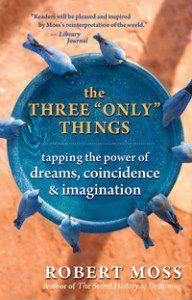 When do you say, “What a coincidence”?
When do you say, “What a coincidence”?
You think of someone, and they call you on the phone a minute later.
You dream of a bear, and a black bear walks onto the road in front of you on a country road.
You are wondering how to get through a harrowing phase of your life, and you look out your car window and see a sign in front of a church that says, “Courage is fear conquered by love” – and know this is for you.
In my personal lexicon, a coincidence is a meaningful convergence of inner and outer experiences. The sense of meaning comes from the observer. That sense may be so strong it is thrilling.
Coincidence may be wildly funny. A guy wondering how to handle a date noticed the following bumper sticker on a red sports car in front of him: “Your body is a temple. Mine is an adventure theme park.”
Coincidence can inspire a sense of awe, a feeling we are in the presence of the numinous. It’s been said that coincidence is God’s way of remaining anonymous.
I think it’s like this: When we go dreaming, we go beyond the curtain of consensus reality. We get out there. We operate outside the rules of a three-dimensional reality, in a spacious Now. We enter parallel and other worlds. Conversely, when coincidence is in play, the powers of that deeper universe — let’s call it the multiverse, as scientists often do — come pushing or poking or tickling through the curtain of the obvious to wake us up to the moreness of everything.
Next question: how often have you said, “it’s just coincidence” or, alternatively, it’s not coincidence”? Both phrases reflect a confusion that has seeped deep into our language, and leaves us tongue-tied or tongue-twisted when it comes to talking about one of the greatest everyday sources of guidance and energy that is available to us. When we say that an incident is “just” coincidence, we mean that it is meaningless, not worth spending time on. When we say that something is “not” coincidence, we are typically saying that it is meaningful and important.
The truth is that coincidence is always meaningful, and sometimes very important. It’s when the universe gets personal.
I’ve been laboring to help us talk about this phenomenon more coherently, as part of recognizing and working with it. I’m not ready to give up the word “coincidence” despite our confusion of tongues. Jung despaired of ever getting it the respect it deserves, and made up the word “synchronicity” as a scientific-sounding substitute. I often use the word synchronicity because it sounds respectable. But like quantum physicist Wolfgang Pauli, who helped Jung develop his synchronicity theory, I’m not an enthusiast, because “synchronicity” literally means a coincidence of events at the same time, synchronously, while meaningful coincidence may actually involve a sequence of similar events over a period of time. Pauli wanted to use the term isomorphy, which means the recurrence of the same forms. I like this, but I doubt it’s going to become part of our household vocabulary.
Pauli also liked the old word “correspondence” (as in “meaningful correspondences”), as poets and mystics have always done.. As above, so below, runs the famous hermetic motto. Things here “correspond” to things above (or below). In the world around us, things also resemble and “correspond” with each other.
Personally, I see no need to give up on the word “coincidence” just because we have fallen into a bad habit of dissing it; habits can be changed.
In its root meaning (from the Latin), a coincidence takes place when two or more incidents “fall together.” The word does not specify that these events happen at exactly the same time. But the events are related.
Think of what happens when you toss a set of pick-up sticks. Slow down the motion in your mind’s eye, and imagine the sticks coming down very slowly, over an extended period of time. Now imagine a minuscule being who experiences long gaps between the arrival of objects that seem to be falling from thin air, and cannot see where they are coming from. When the observer sees two or more of these objects arrive at the same time, he is amazed and says, “What a coincidence!” When he travels a great distance and finds an object resembling the ones he has just seen, his surprise deepens. When similar objects continue to appear, over variable time intervals, he is astounded. From where he stands, the fall of each stick (or clumping of sticks) is an independent occurrence. It resembles something that happens before or after, but is not causally connected in any way that he can see. He does not know what the game player (a giant invisible to him) knows: events that manifest at discrete points in space and time, as experienced by the minuscule observer, are the result of a single movement on another plane.
I want to reclaim the word “coincidence” because I like the notion of things “falling together” with the implied action of a hidden hand. Coincidences are homing beacons. They are secret handshakes from the universe. They are extraordinary sources of guidance and direction.
Part of this article is adapted from The Three “Only” Things, published by New World Library.

